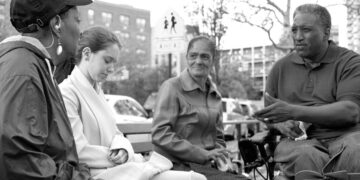Scott Pohl / WKAR. Img source: www.michiganpublic.org
May 15, 2024 Story by: Editor
Efforts are currently being made to locate and potentially excavate a significant Civil War site in Detroit, where a regiment of Black Union soldiers from Michigan and Canada prepared for battle.
Camp Ward was situated on Detroit’s near east side, in the Lafayette Park neighborhood. Although a state historic marker is present near the site, the exact location of this former farm had been uncertain.
That changed last summer when researchers from the Michigan Underground Railroad Exploratory Collective, the Charles H. Wright Museum of African American History, and the University of Michigan’s Museum of Anthropological Archaeology used ground-penetrating radar to uncover the site’s remains.
Nubia Wardford Polk, the director of archaeology for the Camp Ward project, said the radar scan produced “very, very clear” images. “It was unbelievably clear,” she noted. “It was almost like looking at photographs.”
The scans also revealed other historical markers, including the former Black Bottom neighborhood and signs of French and British colonial settlements, all found within a four-foot layer beneath the surface.
Camp Ward served as the training ground for Michigan’s Black Civil War regiment, initially known as the First Michigan Colored Regiment and later the 102nd U.S. Colored Troops. Barbara K. Smith, co-founder and executive director of MUREC, described the conditions there as “deplorable,” reflecting the discrimination and inferior conditions Black soldiers often faced.
Despite these challenges, the regiment attracted Black men from across southern Michigan and eastern Canada. According to Smith, around 11,000 former slaves who had escaped to Canada returned to fight for the Union.
“They wanted to go back and fight, I guess, for their loved ones who were still in bondage and being oppressed,” Smith said. “And that just warms my heart for them to make that sacrifice.”
Smith highlighted the severe risks Black soldiers faced, including the threat of re-enslavement or execution if captured by Confederate forces. They also endured undesirable assignments, lower pay, and denial of military honors for valor. However, their bravery was evident on multiple occasions. Source: Michigan Public
The Detroit Historical Society notes that the regiment, mustered out of Detroit in February 1864, was sent deep into the South, primarily in South Carolina. They conducted several expeditions behind Confederate lines, dismantling railroads and other infrastructure, and participated in numerous battles, emerging victorious in each skirmish.
In October 1865, the regiment returned to Detroit from South Carolina, where they were received similarly to a white regiment. A Detroit Free Press report from that time, despite initially opposing the formation of a Black Michigan regiment, acknowledged that “The Colored troops fought nobly.”
Wardford Polk stated that the Camp Ward project is still in its early stages. The goal is to excavate part of the site and transform it into an educational attraction. They are seeking donations and permission from landowners to dig on their properties.
Additionally, Wardford Polk emphasized the importance of changing the broader historical narrative. “These men were freedom fighters,” she said. “I just think it’s just an important thing for everybody, not only African Americans, to know. I would like our history to become seen as part of the whole historical scheme, instead of an aside.”

















